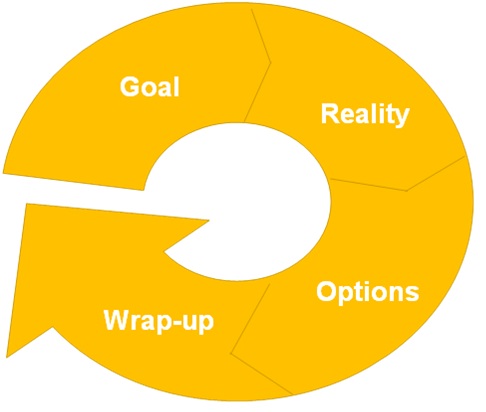Coaching and Mentoring is increasingly recognised as one of the most effective ways to enhance the skills and behaviours of others. It is about helping others to help themselves. Following the proverb:
“Give a man a fish and you feed him for a day. Teach a man to fish and you feed him for a lifetime”
A recognised model for such a meeting is the GROW model. It will help provide a step by step process and will ensure your discussions with them “Support and encourage people to manage their own learning in order that they may maximise their potential, develop their skills, improve their performance and become the person they want to be “ (The Oxford School of Coaching & Mentoring )
The GROW model is a useful technique for structuring mentoring and coaching sessions

Establish the GOAL
First, with your team member, you must define and agree the goal or outcome to be achieved. You should help them to define a goal that is specific, measurable, achievable and realistic.
Useful coaching questions include:
- What is it you would like to discuss?
- What would you like to achieve?
- What would you like from/to achieve in this session?
- What would need to happen for you to walk away feeling that this time was well spent?
- If I could grant you a wish for this session, what would it be?
- What would you like to be different when you leave this session?
- If you could have anything from this session what would it be?
- What would happen that is not happening now, or what would not happen that is happening now?
- What outcome would you like from this session/discussion/interaction?
- Is that realistic?
- Can we do that in the time we have available?
- Will that be real value to you?
Explore the current REALITY
Next, invite your team member to self assess themselves describing their current reality. This is a very important stage as it provides an opportunity to avoid and check assumptions weeding out any irrelevancies. It is difficult to solve a problem if there is key information missing. While possible solutions might merge avoid problem solving at this stage.
Useful coaching questions include:
- What is happening at the moment?
- How do you know that this is accurate?
- When does this happen?
- How often does this happen? Be precise if possible
- What effect does this have?
- How do you know there is a problem?
- How have you verified or would you verify that that is so?
- What other factors are relevant?
- Who else is relevant?
- What is their perception of the situation?
- What else?
- What have you tried so far?
Identify and review the Options
Now it is time to explore the options available to solve the problem. Help them to review each option identifying the strengths and weaknesses of each. By all means, offer your own suggestions but wait to be invited to make suggestions and get them to offer their ideas first.
Useful coaching questions include:
- What could you do?
- What alternatives are there?
- Tell me what possibilities for action you see? Do not worry about whether they are realistic at this stage.
- What have you seen used, or used yourself in other similar circumstances?
- Who might be able to help?
- Would you like suggestions from me?
- What are the benefits and pitfalls of doing that?
- Which of these do you like most?
- Of these, which are of interest to you?
- Rate from 1-10 your interest level in the practicality of each of these?
- Would you like to choose one to act on?
Wrapping Up the meeting
The final stage is to get the team member to commit to specific action. Work with them to identify what they are going to do, when they are going to do it and what support and resources they might need.
Useful coaching questions include:
- What is/are the next steps?
- Precisely when will you do them?
- What might get in the way?
- Do you need to enter the steps in your diary?
- What support do you need?
- How and when will you enlist that support?

Comments (0)